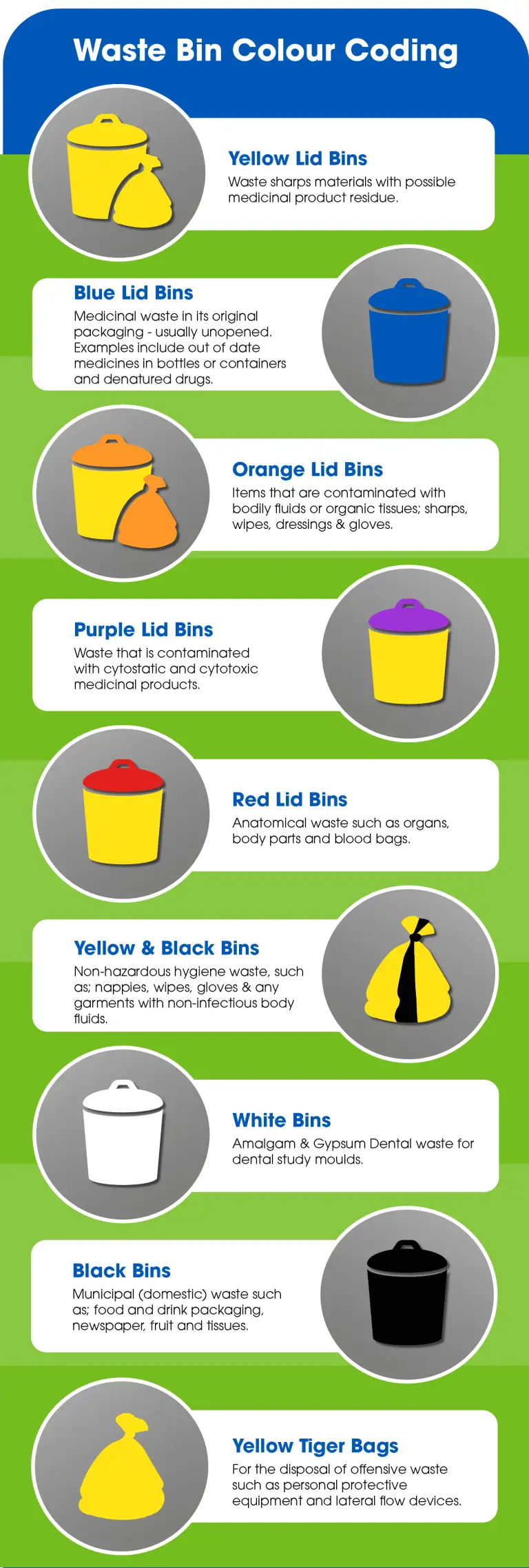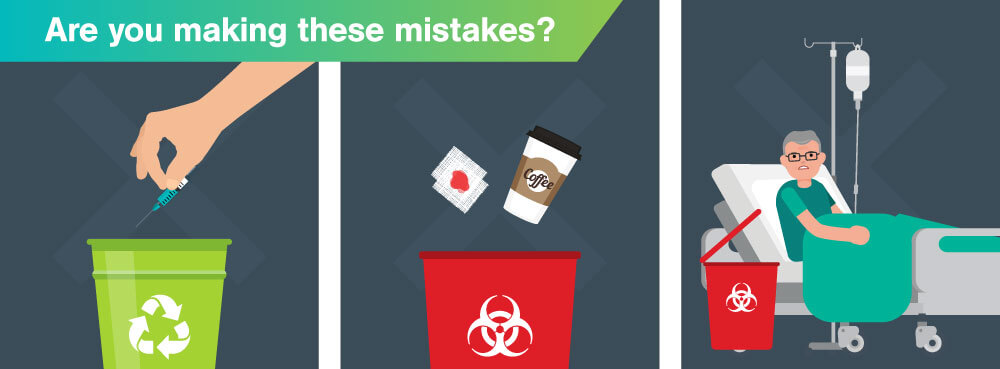Strategic Medical Waste Disposal Solutions: Promoting Safety and Sustainability
Wiki Article
The Value of Effectively Managing Medical Waste
Proper monitoring of clinical waste is of utmost relevance in health care centers. The handling, storage space, and disposal of clinical waste require rigorous adherence to laws and guidelines to make certain the safety of clients, health care employees, and the atmosphere. Medical care centers have lawful and governing responsibilities to properly handle medical waste, and failing to abide can result in penalties and legal repercussions.Wellness Dangers Connected With Improper Waste Management
Incorrect management of clinical waste positions substantial health and wellness threats to both healthcare workers and the basic public - WasteX Medical Waste Disposal. Clinical waste, which includes sharps, contagious products, drugs, and contaminated compounds, requires appropriate handling and disposal to stop the spread of infections, injuries, and direct exposure to hazardous materials
One of the primary wellness threats related to inappropriate clinical waste administration is the transmission of contagious diseases. Healthcare workers that enter call with contaminated waste may get conditions such as HIV, hepatitis, or various other bloodborne microorganisms. If medical waste is not effectively disposed of, it can pollute the environment, water sources, and even food, leading to the spread of illness within the area (medical waste removal).
Inappropriate waste monitoring can likewise cause injuries, especially from sharps such as needles, scalpels, and broken glass. Unintended needle pricks can lead to the transmission of bloodborne conditions, while cuts from sharp things can cause serious wounds and infections.
Moreover, the incorrect disposal of pharmaceutical waste can bring about the contamination of water supplies. When run out or unused medicines are flushed down the toilet or thrown out inappropriately, the chemicals can leach right into water resources, impacting marine life and potentially entering the human food chain.
Environmental Impact of Incorrectly Disposed Medical Waste
One of the considerable consequences of poor management of medical waste is its detrimental effect on the environment. Incorrectly disposed clinical waste poses a significant danger to communities, water bodies, and the general equilibrium of the environment. WasteX Medical Waste Disposal. The dangerous products had in clinical waste, such as transmittable representatives, pharmaceuticals, and chemicals, can contaminate dirt, air, and water, leading to extensive contamination and destructionWhen clinical waste is not effectively segregated, treated, and disposed of, it can find its method right into water bodies via inappropriate land fill methods or unlawful unloading. This can result in the contamination of groundwater and surface water, impacting water life and possibly polluting drinking water resources. The release of dangerous chemicals and drugs right into the setting can disrupt communities and damage both animal and plant species.
Furthermore, incorrect incineration of medical waste can release hazardous toxins, consisting of furans and dioxins, right into the environment. These toxins have actually been connected to different health and wellness concerns, including respiratory troubles, reproductive problems, and even cancer. The release of greenhouse gases throughout incineration likewise contributes to environment adjustment.
To alleviate the environmental impact of improperly disposed medical waste, it is essential to implement correct waste monitoring practices. This includes partition of waste at the source, ideal treatment techniques, and safe disposal strategies. By doing so, we can reduce the contamination and shield the atmosphere from the damaging effects of clinical waste mismanagement.
Regulatory and lawful Obligations for Medical Care Facilities
In order to resolve the ecological impact of poorly disposed clinical waste, health care facilities are needed to follow governing and legal commitments. These obligations are placed in location to make certain the appropriate handling, storage space, transport, and disposal of medical waste in a environmentally responsible and risk-free fashion.One of the key lawful responsibilities for medical care facilities is to get the essential permits and licenses for taking care of medical waste. This includes getting a waste generator identification number and adhering to government, state, and neighborhood policies. Medical care centers should likewise keep detailed records of the types and amounts of medical waste created, as well as the techniques utilized for its disposal.
Moreover, healthcare facilities need to apply correct partition and product packaging procedures for different types of medical waste, such as sharps, infectious waste, and pharmaceutical waste - medical waste removal service. This includes utilizing leak-proof containers, biohazard bags, and sharps containers that satisfy regulative criteria
Healthcare centers are also in charge of making sure that their team obtain ideal training on the correct handling and disposal of clinical waste. This includes training on infection control, personal protective equipment, and waste management protocols.
Finest Practices for Safe Handling and Disposal of Medical Waste
To ensure the safe handling and disposal of medical waste, healthcare centers need to apply ideal techniques. These methods are essential to shield the wellness and safety and security of both medical care workers and the public. The appropriate management of clinical waste is vital in preventing the spread of transmittable conditions and decreasing environmental contamination.One of the best practices for secure handling and disposal of clinical waste is partition. Medical care centers ought to separate various kinds of clinical waste, such as sharps, transmittable materials, and pharmaceutical waste, to stop cross-contamination. Correct labeling and color coding of waste containers also play a vital duty in making sure the right segregation of clinical waste.
Another vital best practice is the usage of suitable containers for saving and transporting medical waste. These containers need to be leak-proof, puncture-resistant, and properly sealed to avoid any possible release of hazardous products. Furthermore, medical care centers ought to develop clear protocols for the collection, storage space, and transport of clinical waste to minimize the danger of direct exposure and contamination.
Moreover, healthcare centers should educate their team on the correct handling and disposal of clinical waste. Normal training sessions and correspondence course need to be conducted to maintain healthcare workers upgraded on the current policies and standards. This will certainly assist guarantee that every person entailed in the process knows the potential dangers and is outfitted with the necessary understanding and skills to take care of medical waste safely.
Education and Training for Healthcare Professionals in Waste Monitoring
Medical care professionals require extensive education and training in waste monitoring to ensure the proper handling and disposal of medical waste. The management of medical waste is a critical component of healthcare operations as it straight influences the health and wellness of both health care employees and the public. Correct education and learning and training equip health care experts with the needed understanding and skills to deal with and dispose of medical waste in a secure and environmentally responsible fashion.Education and training programs for health care professionals in waste monitoring cover a series of subjects, consisting of the classification and partition of clinical waste, correct product packaging and labeling, storage and transportation demands, and the usage of individual protective tools. These programs likewise emphasize the relevance of adherence to local, nationwide, and global laws and standards controling clinical waste management.
By obtaining extensive education and training in waste monitoring, health care specialists can successfully lessen the risks associated with clinical waste, such as the transmission of infectious diseases and the potential injury to the environment. WasteX Medical Waste Disposal. Additionally, well-trained specialists can determine and apply ideal methods that advertise sustainability and efficient waste monitoring practices within healthcare centers.
Continuous education and training in waste monitoring ought to be a continuous top priority for healthcare experts, as waste monitoring techniques and regulations may progress with time. By staying up-to-date with the most recent growths in waste management, healthcare experts can make sure that they are outfitted with the expertise and skills required to make informed decisions and contribute to the total enhancement of waste administration techniques in medical care setups.

Final Thought
In conclusion, correct administration of medical waste is crucial to mitigate health and wellness dangers and minimize the ecological impact. Healthcare centers have regulative and lawful commitments to make sure safe handling and disposal of clinical waste.
Healthcare experts call for comprehensive education and training in waste management to make sure the correct handling and disposal of medical waste - medical waste disposal. The monitoring of medical waste is a vital element of medical care operations as it straight influences the health and safety of both health care workers and the general public
Report this wiki page